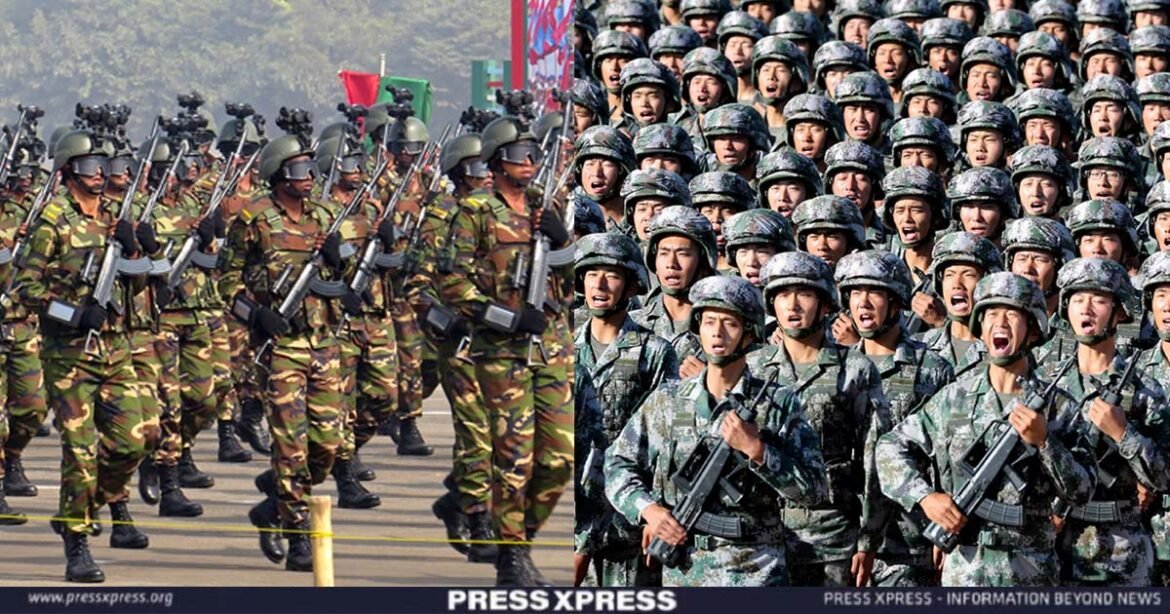Bangladesh and China have been experiencing military ties since the independence of Bangladesh. The relationship is expected to further strengthen through the joint military exercises which are going to take place early this month.
In 2016, the Bangladesh Navy was supplied with two renovated submarines by China at a reduced cost of $205 million. Furthermore, the Prime Minister of Bangladesh, Sheikh Hasina, inaugurated a submarine base constructed by China last year, which was worth $1.21 billion.
You Can Also Read: Houthis Gain Greater Limelight via Red Sea Attacks!
Situated at Cox’s Bazar along the coast of the Bay of Bengal, this base has the capacity to accommodate six submarines and eight warships concurrently. The enhanced relationship between China and Bangladesh, particularly in terms of naval collaboration, is a result of the Defense Cooperation Agreement of 2002, which encompasses military training and defense supplies.
The China-Bangladesh Golden Friendship 2024 joint exercises were announced by Senior Colonel Wu Qian, the spokesperson for the Chinese Defense Ministry, in Beijing on April 25. He stated that the first-ever joint military exercises between Bangladesh and China would commence in early May.

As per the mutual agreement between the two nations, the Chinese People’s Liberation Army (PLA) will send a delegation to Bangladesh in early May to partake in the joint training, as stated by the ministry.
This joint training, which is based on United Nations peacekeeping anti-terrorism operations, will see both sides adopting an integrated training methodology. They will collaboratively conduct exercises such as bus hostage rescue and terrorist camp clearance. The joint drill in Bangladesh, which is predicated on United Nations peacekeeping anti-terrorism operations.
China’s Military Strategy
China’s military approach involves participating in international joint military exercises, which is seen as a vital component of deploying military strength overseas. This is classified under what strategists refer to as ‘non-war military operations’. These exercises, whether bilateral or multilateral, are often perceived as the ‘soft use’ of ‘hard power’ on the global stage.
China is utilizing joint military exercises as a tool of foreign policy to express its camaraderie and fortify military relationships with neighboring countries, particularly in the face of escalating strategic rivalry with the United States in the Asia-Pacific region.

These drills act as a diplomatic instrument, enabling China to establish stronger defense relationships with its neighbors. A case in point is China’s forthcoming multinational joint exercise named Aman Youyi. This exercise will include five Southeast Asian nations: Cambodia, Laos, Malaysia, Thailand, and Vietnam, scheduled for later this year. The exact date, extent, and nature of the drills are currently under negotiation.
This strategy adopted by China aims to deepen mutual comprehension with friendly nations and bolster mutual political and military trust.
China’s Friendship Drills
The Chinese People’s Liberation Army (PLA) recently held the Friendship Shield 2023 joint military exercises with the Lao People’s Armed Forces (LPAF) at the LPAF’s Kommadam Academy in Laos in May 2023. A high-ranking Chinese officer underscored the significance of this joint training exercise in fostering mutual trust and improving interoperability between the two militaries.
In addition, in April, the People’s Liberation Army conducted a joint patrol with Vietnam in the Beibu Gulf, signifying the first meeting between the senior leaders of the two countries’ maritime law enforcement agencies. China also engaged in a joint maritime exercise with Singapore in late April.
In the latter part of March and the beginning of April, the PLA executed a joint military drill with Cambodia named Golden Dragon 2023. Cambodia is one of the nations that have historically maintained robust relationships with China.
Vice Admiral Wei Wenhui, the deputy commander of the PLA’s Southern Theater Command, emphasized that the China-Cambodia joint exercise served as a vital platform for exchanges, mutual learning, and joint training between the two militaries. It also played a significant role in ‘achieving the anticipated goal of strengthening the deep friendship and enhancing security cooperation’.
Beijing typically employs military exercises for a broad range of purposes: from military training objectives – enhancing the quality of military performances and combat readiness and preparedness, and testing new weapons – to wider foreign policy goals. With the escalating tensions in the Taiwan Strait, Beijing’s primary aim is to ensure that its neighbors do not align with the United States against China by reassuring them of its friendship through various diplomatic measures, including joint military exercises.
India Will Keep Close Watch
The upcoming joint military exercises will be closely observed by neighboring India. “We maintain vigilant surveillance on all activities that occur in our vicinity and beyond, which have implications for our interests, both economic and security-related, and we respond accordingly,” stated Randhir Jaiswal, the spokesperson for India’s Ministry of External Affairs, at a press conference in response to a query about the forthcoming Sino-Bangladeshi joint military exercises.
India and Bangladesh have robust cultural, social, and economic connections. The weapons and submarines supplied by China to Bangladesh do not pose an immediate security risk to India.
Previously, between 2009 and 2023, Bangladesh and India have conducted 11 military drills. This time, Bangladesh will have a unique experience in the friendship drills with China. This drill will enhance the friendship between Bangladesh and China.
Monish Tourangbam, the honorary director at the Kalinga Institute of Indo-Pacific Studies (KIIPS), stressed that “The China-Bangladesh joint military exercise, which will reportedly concentrate on counter-terrorism scenarios, will not immediately unsettle New Delhi. However, India plays a pivotal role in constructing a multipolar South Asia that believes in a consultative partnership with its neighbors in the face of China’s expanding influence in the region.”
“Bangladesh, and indeed the South Asia region, is evidently in need of development and infrastructure support, and China’s growing role is a reality that India should acknowledge,” he added.
The announcement of the Sino-Bangladeshi joint military exercises signifies a notable shift in regional politics. With China’s escalating economic and military involvement in Bangladesh, questions are raised about its implications for Bangladesh’s relationship with India, as well as the wider geopolitical dynamics in the region.


